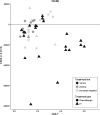Reviewing the quality, health benefit and value for money of chemotherapy and targeted therapy for metastatic breast cancer
- PMID: 28689361
- PMCID: PMC5602061
- DOI: 10.1007/s10549-017-4374-6
Reviewing the quality, health benefit and value for money of chemotherapy and targeted therapy for metastatic breast cancer
Abstract
Purpose: To provide an overview of model characteristics and outcomes of model-based economic evaluations concerning chemotherapy and targeted therapy (TT) for metastatic breast cancer (MBC); to assess the quality of the studies; to analyse the association between model characteristics and study quality and outcomes.
Methods: PubMED and NHS EED were systematically searched. Inclusion criteria were as follows: English or Dutch language, model-based economic evaluation, chemotherapy or TT as intervention, population diagnosed with MBC, published between 2000 and 2014, reporting life years (LY) or quality-adjusted life-year (QALY) and an incremental cost-effectiveness ratio. General characteristics, model characteristics and outcomes of the studies were extracted. Quality of the studies was assessed through a checklist.
Results: 24 studies were included, considering 50 comparisons (20 concerning chemotherapy and 30 TT). Seven comparisons were represented in multiple studies. A health state-transition model including the following health states: stable/progression-free disease, progression and death was used in 18 studies. Studies fulfilled on average 14 out of the 26 items of the quality checklist, mostly due to a lack of transparency in reporting. Thirty-one per cent of the incremental net monetary benefit was positive. TT led to higher iQALY gained, and industry-sponsored studies reported more favourable cost-effectiveness outcomes.
Conclusions: The development of a disease-specific reference model would improve the transparency and quality of model-based cost-effectiveness assessments for MBC treatments. Incremental health benefits increased over time, but were outweighed by the increased treatment costs. Consequently, increased health benefits led to lower value for money.
Keywords: Breast neoplasms; Cost-benefit analysis; Economic; Models; Neoplasm metastasis; Quality-adjusted life-years; Review.
Conflict of interest statement
Conflict of interest statement
XP and BR declare that they have no conflict of interest. MJ has received a grant for the set-up of a Dutch breast cancer registry from the Netherlands Organisation for Health Research and Development (ZonMw, grant number: 80-82500-98-9056), Roche Netherlands and Eisai.
Statement on the welfare of animals/respect of human rights
This article does not contain any studies with human participants or animals performed by any of the authors.
Informed consent
Not applicable.
Figures




Comment in
-
Lazzaro responds to Pouwels et al.Breast Cancer Res Treat. 2021 Nov;190(1):1. doi: 10.1007/s10549-021-06347-9. Epub 2021 Aug 5. Breast Cancer Res Treat. 2021. PMID: 34355299 No abstract available.
References
-
- Global Cancer Observatory International Agency for Research on Cancer (World Health Organisation). http://gco.iarc.fr/today/online-analysis-multi-bars?mode=cancer&mode_pop.... Accessed 3 Aug 2016
-
- Drummond M, McGuire A. Economic evaluation in health care: merging theory with practice. Oxford: Oxford University Press; 2001.
Publication types
MeSH terms
LinkOut - more resources
Full Text Sources
Other Literature Sources
Medical

